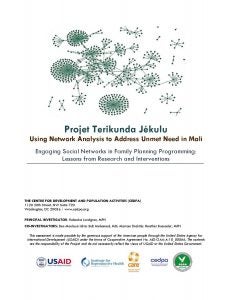[Terikunda Jékulu] Engaging Social Networks in Family Planning Programming: Lessons from Research and Interventions, Mali
This report summarizes ethnographic research and situational analysis, conducted in Mali as part of the Terikunda Jékulu project, to assess norms and community dynamics around voluntary use of family planning. Findings indicate that any attempt at addressing unmet need for family planning in Mali is likely to encounter significant resistance. Religious opposition to contraception and the premium placed on high fertility are entrenched social norms in the rural communities of the country. Broaching topics that could be perceived as birth limiting are strictly taboo. Furthermore, challenging gender dynamics that may reduce the power that men have over their families’ procreation and lineage may be perceived as threatening. This report examines family planning (FP) literature and interventions to understand how social network ideas are used to overcome many of these barriers. Particular attention is given to the individuals and groups who play key roles in decisions regarding fertility and FP. The approaches examined focus on demand creation as both a practical and socially transformative means to addressing unmet need. The conclusion lists specific recommendations learned from various social network approaches and the implications for the Terikunda Jékulu project.
Keywords: Social Networks, Terikunda Jékulu, Tekponon Jikuagou, TJ, Mali, Benin
Resource Snapshot

Publisher CEDPA/IRH
 Where We Work
Where We Work  Press Room
Press Room  FACT Project
FACT Project  Passages Project
Passages Project  Learning Collaborative
Learning Collaborative  Search All Resources
Search All Resources  Social Norms
Social Norms  Fertility Awareness Methods
Fertility Awareness Methods